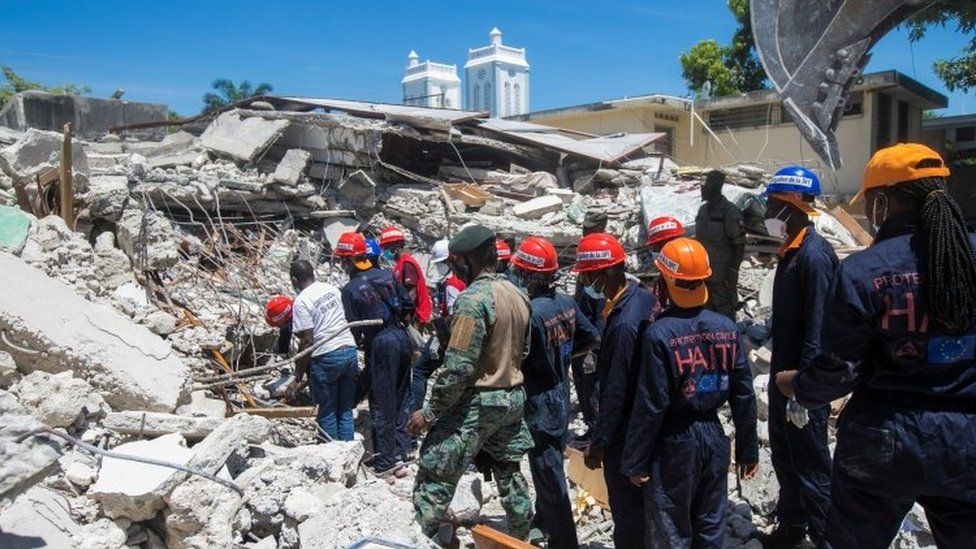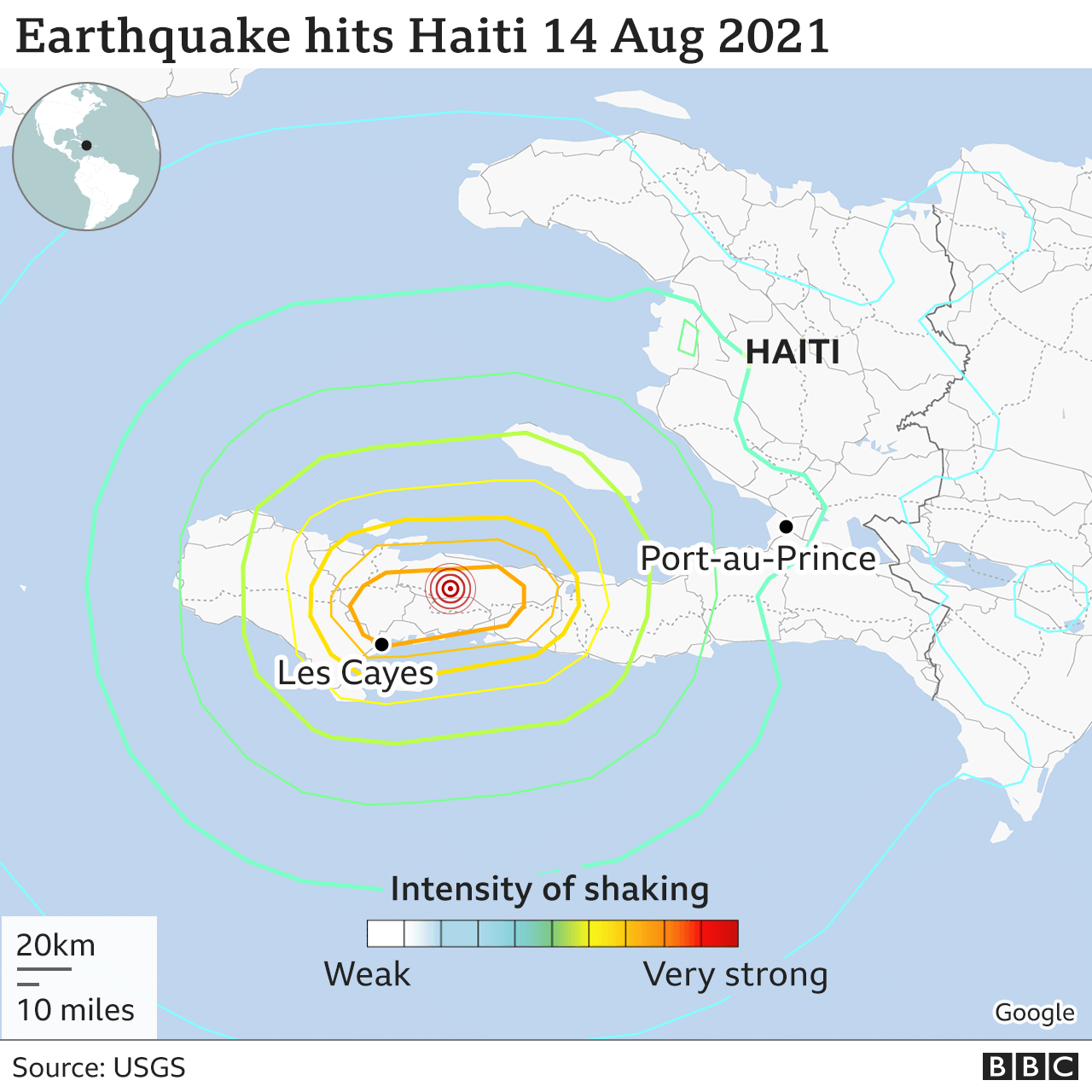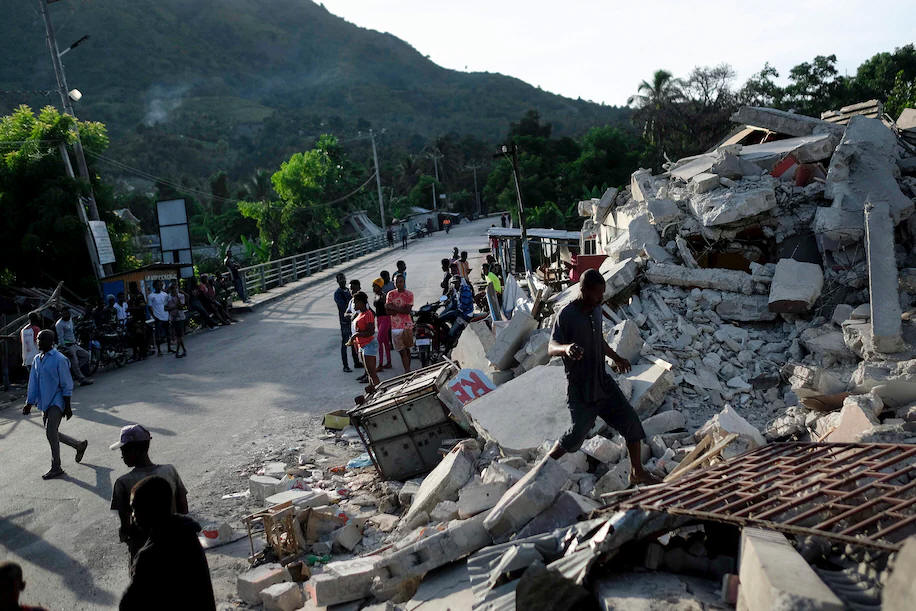www.aljazeerah.info
News, August 2020
Archives
Mission & Name
Conflict Terminology
Editorials
Gaza Holocaust
Gulf War
Isdood
Islam
News
News Photos
Opinion Editorials
US Foreign Policy (Dr. El-Najjar's Articles)
www.aljazeerah.info
|
Editorial Note: The following news reports are summaries from original sources. They may also include corrections of Arabic names and political terminology. Comments are in parentheses. |
1,419 People Died in the Haiti 7,2 Magnitude Earthquake, Unknown Number Still Missing
August 16, 2021
 |
 |
| Rescue workers in Haiti after the August 14, 2021 earthquake |
 |
|
| A collapsed building in Saint-Louis-du-Sud, Haiti, due to the August 14, 2021 earthquake |
Aid workers scramble to save Haiti earthquake victims as storm barrels in
Washington Post, August 16, 2021
By Ingrid Arnesen , Mary Beth Sheridan and Widlore Merancourt
PORT-AU-PRINCE, Haiti —
Rescue workers and doctors with little equipment worked feverishly Monday to save victims of the massive earthquake in southwestern Haiti as a powerful storm threatened to unleash flooding and further snarl aid efforts.
Heavy rains started dousing the country on Monday afternoon, creating yet another crisis for exhausted, newly homeless people who needed shelter. Officials estimated that Tropical Depression Grace would dump five to 10 inches of rain on the region by Tuesday. The U.S. National Hurricane Center warned that Grace, while downgraded from a tropical storm, could still cause flash flooding and mudslides in Haiti and the Dominican Republic.
“We’re pleading for help,” Marie-Helene L’Esperance, mayor of the harbor town of Pestel, told Haiti’s Pacific Radio. “Every house was destroyed, there’s nowhere to live, we need shelters, medical help and especially water. We’ve had nothing for three days and injured victims are starting to die.”
She said the prospect of heavy rain had “spread fear through residents who had nothing left but to pray.”
The 7.2-magnitude earthquake that struck Saturday morning has killed at least 1,419 people, according to the country’s civil protection office, but that figure was expected to climb. Schools, medical centers, churches, bridges and more than 84,000 homes collapsed or were damaged in the temblor, which struck a region already battered by Hurricane Matthew in 2016.
The tragedy was the latest for the Western Hemisphere’s poorest nation — coming on top of a coronavirus outbreak, rising gang violence, an economic crisis and acute political instability after the assassination of President Jovenel Moïse last month. Haiti was devastated 11 years ago by an earthquake that reduced the capital to ruins.
Hundreds were killed and large parts of southwestern Haiti were in ruins after a 7.2 earthquake on Aug. 14. The country is still recovering from a 2010 quake. (Lee Powell, Yvon Vilius/The Washington Post)
On Monday, aid began to trickle in to some of the worst-hit areas. A 65-member search-and-rescue team from Fairfax County, Va., dispatched by USAID, arrived in Haiti and headed for Les Cayes, a city of about 100,000 people on the country’s southwest peninsula. UNICEF said it had sent medical kits for 30,000 people to the city, roughly 90 miles west of Port-au-Prince, the capital. The U.S. Coast Guard was ferrying injured victims to the capital.
Mexico, the Dominican Republic, Chile and other countries also sent assistance. Haitian Prime Minister Ariel Henry pledged to speed up the relief effort. “From this Monday, we will move faster. Aid provision is going to be accelerated,” he wrote on Twitter.
Elizabeth Riley, executive director of the Caribbean Disaster Emergency Management Agency, said the Haitian government was prioritizing cash donations, because supplies could be purchased in the capital and other areas not pummeled by the quake.
But aid workers expressed concern about violent gangs that have largely cut off the main road from the capital to the southwest in recent months. U.N. spokesman Stephane Dujarric said local authorities were negotiating with the armed groups to gain access, and a six-vehicle U.N. aid convoy had traveled the route without incident on Sunday.
“We do hope that roads will be increasingly be accessible and non-risky,” Muhamed Bizimana, the assistant country director for CARE, said in a phone interview from Port-au-Prince. He said the aid group’s prepositioned supplies were running low in some areas.
Violent gangs weren’t the only problem. Jerry Chandler, head of Haiti’s civil protection agency, said Colombian search-and-rescue teams that planned to travel from Port-au-Prince to the northern part of the affected area — including the port town of Jeremie — had difficulty getting through on Monday. “The difficulty is that the bridge over the Glace River collapsed,” blocking travel over National Route 7, a crucial artery, he said. The bridge was later repaired, but debris continued to block smaller roads.
Location of the 7.2-magnitude earthquake in Haiti
In Beaumont, normally a two-hour drive south from Jeremie, residents were still waiting Monday afternoon for any signs of help, according to former mayor Alexi Faveur, a member of the community development association. He said the 31,850 residents were on their own as the rains approached.
“Eighty percent of all homes have been destroyed, and any passable road has been blocked by mudslides,” he said in a telephone interview. Outlying communities were accessible only by foot, he said.
Martinor Gerardin, mayor of L’Asile, a town of 52,000 northeast of Les Cayes, said most homes there, too, were destroyed or severely damaged. He estimated that 50 residents had been killed and 500 injured. Scores of cows and goats in the rural community had been buried under rubble, he said, threatening the inhabitants’ livelihoods. No aid from the government or nonprofit groups had arrived by Monday, he said. “We needs tents and water urgently,” he said.
Jean David Geneste , a former parliamentary deputy, called the earthquake damage “catastrophic.”
“Medical help is urgently needed,” he told Radio Caraibes. “It’s critical in the first two to four days. We have many injured with fractured limbs and need to mobilize basic materials like painkillers, bandages, braces. We have to perform urgent operations but don’t have the equipment.”
A man walks on a collapsed building in Saint-Louis-du-Sud, Haiti, on Sunday. (Matias Delacroix/AP)
Hospitals in heavily damaged towns were overwhelmed, with patients lying on cots or mattresses outside because of a lack of space, according to photos. Lucette Gedeon, a pediatrician volunteering in the neonatal unit at the main hospital in Les Cayes, told Reuters that the facility had exhausted its supply of antibiotics and anesthesia.
“There have been babies that came in needing limbs amputated after they were trapped under the rubble,” Gedeon said.
Haiti’s health system was already fragile. Then came the coronavirus pandemic. Until last month — when the U.S. government donated 500,000 shots of the Moderna coronavirus vaccine through the Covax aid initiative — Haiti was the only country in the Americas that hadn’t received a single vaccine dose.
Among those who died in Saturday’s quake was Ousmane Touré, en epidemiologist from Guinea “who helped beat Ebola in West Africa & Congo & was deployed to Haiti for the #COVID19 response,” tweeted Tedros Adhanom Ghebreyesus, the head of the World Health Organization. He said he was “devastated” by the loss.
The earthquake pushed Haiti’s stressed hospitals to the brink of collapse.
“Basically all the health facilities are overwhelmed, all the referral hospitals are full,” said CARE’s Bizimana. “And there are still people coming in.”
***
Haiti earthquake: Death toll climbs as tropical storm nears
BBC, August 17, 2021Rescue workers are rushing to locate survivors of the deadly earthquake that struck Haiti on Saturday (August 14, 2021), as a tropical storm is heading towards the Caribbean nation.
At least 1,419 people are known to have died in the 7.2-magnitude quake and an unknown number are still missing.
Tropical Depression Grace is expected to pass over the worst affected area later on Monday.
It is feared heavy rain brought by Grace could trigger landslides.
Roads already made impassable by the quake could be further damaged by the rains, so aid teams are racing to get essential provisions to the quake-hit region before Grace hits.
A tropical storm watch is in effect for the entire coast of Haiti as well as for the neighbouring Dominican Republic.
Search and rescue teams have been arriving from the United States and Chile, with more on the way from Mexico. Cuban medical teams are already in Haiti and helping people.
Humanitarian organisations say survivors need drinking water and shelter. More than 30,000 families have reportedly been left homeless.
Homes, churches and schools were among buildings flattened in the quake. Some hospitals were left overwhelmed and in need of supplies as they struggled to treat the injured, of whom there are more than 6,900.
The earthquake compounds problems facing the impoverished nation, which is already reeling from a political crisis following the assassination of its president last month.
The south-west of Haiti appears to have suffered the worst of the damage, especially around the city of Les Cayes.
Footage on social media showed residents desperately trying to pull victims from ruined buildings.
"The streets are filled with screaming," Archdeacon Abiade Lozama, head of an Anglican church in Les Cayes, told the New York Times. "People are searching, for loved ones or resources, medical help, water."
The epicentre of Saturday's quake (August 14, 2021) was about 12km (7.5 miles) from the town of Saint-Louis du Sud, the US Geological Survey (USGS) said.
But the tremor could be felt in the densely-populated capital of Port-au-Prince, some 125km away, and in neighbouring countries.
Hospitals under fear of collapse
By James Clayton, BBC News, Les Cayes
BBC, August 16, 2021
It's hard enough to treat survivors of any natural disaster but when the hospitals themselves are under fear of collapse it makes it all the more difficult.
Les Cayes Ofatma hospital is deemed too unsafe to stay in so they've brought everyone outside. People swat away flies, on hospital beds placed under makeshift tents and trees. You can hear people screaming in pain.
One woman, Elsy, had only just woken up when the earthquake happened. Her son has a serious fracture to his leg.
There simply aren't the facilities needed to treat people in this remote part of the country. One doctor comes to us, angry, asking why he has no medicine.
One woman we spoke to - who has a very bad broken leg and is also pregnant - has had no pain relief for two days.
The people here need help but at the moment not enough help is coming - and with a tropical storm close by it could become even more difficult.
Prime Minister Ariel Henry declared a month-long state of emergency and urged the population to "show solidarity".
The Pope offered prayers for the victims during a Sunday address and expressed hope that aid would arrive soon.
Japanese tennis star Naomi Osaka, whose father is from Haiti, said she would donate her earnings from next week's Western & Southern Open to help finance relief efforts.
Aftershocks were felt after the initial tremor on Saturday, with the USGS initially warning the earthquake could result in thousands of fatalities and injuries.
A 2010 earthquake in Haiti killed more than 200,000 people and caused extensive damage to the country's infrastructure and economy.
Haiti earthquake: Death toll climbs as tropical storm nears - BBC News
***
Share the link of this article with your facebook friendsFair Use Notice
This site contains copyrighted material the
use of which has not always been specifically authorized by the copyright
owner. We are making such material available in our efforts to advance
understanding of environmental, political, human rights, economic,
democracy, scientific, and social justice issues, etc. We believe this
constitutes a 'fair use' of any such copyrighted material as provided for
in section 107 of the US Copyright Law. In accordance with Title 17 U.S.C.
Section 107, the material on this site is
distributed without profit to those
who have expressed a prior interest in receiving the included information
for research and educational purposes. For more information go to: http://www.law.cornell.edu/uscode/17/107.shtml.
If you wish to use copyrighted material from this site for purposes of
your own that go beyond 'fair use', you must obtain permission from the
copyright owner.
|
|
|
|
||
|
||||||


